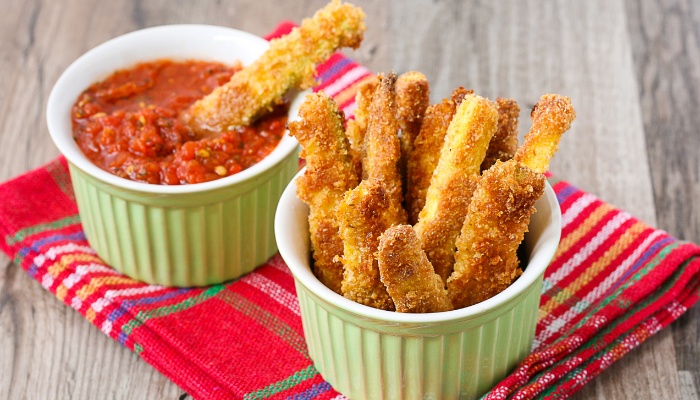French fries are widely available in cafes, family restaurants, and grocery stores, making them a popular food choice. As a result, it’s not uncommon for this high-calorie snack to end up on your child’s plate, sometimes earlier than anticipated or desired.
The question is: how early is too early?
When can babies eat French fries? Infants can eat soft French fries at around 8 months old as they will have enough teeth at this age to begin chewing. As an occasional snack, French fries will not pose a significant health risk, but they should be avoided to prevent poor eating habits in young children.
Most babies and toddlers will go through a picky-eating phase, but giving in too soon with quick and easy options like fast food could start a dangerous precedent, both for your baby’s immediate health and their potential eating patterns as adults.
Let’s look at when your little one can have French fries, whether or not they should, and healthier alternatives to try.
French Fries for Babies – What To Know
A 2018 study found French fries to be the most commonly eaten vegetable by toddlers, and a worrying percentage of infants are exceeding their sodium intake.
Let’s look at when babies can eat them (in moderation) as well as the risks posed by this fried, fatty food.
Why Are French Fries Bad for You?
Because of the oils they are prepared in, consuming French fries on a regular basis can cause stomach pain, digestive issues, and brain fog.
In the long-term, eating French fries more than twice a week can minimize your gut’s healthy bacteria, resulting in a weakened immune system and significantly increasing your risk for a stroke and heart disease.
Should Babies Eat French Fries?
Children develop their preferences and expectations surrounding food based on what is given to them and what they see others eating, so feeding them French fries, even as an occasional snack, could be creating food habits and expectations that are difficult to change later.
French fries offer little to no nutritional value as the oils used in the process are soaked up like a sponge by the potato.
Keep in mind that picky eating habits can kick in before age 2 for 50 percent of children, and early exposure to a large variety of fresh foods is the best way to form long-lasting, positive habits.
Can Babies Choke on French Fries?
Yes. Cooked French fries may be mostly soft and mushy, but pieces may occasionally break off (such as the hard, crispier tip), posing a choking hazard.
The skin on potato fries can increase the choking risk too, so try to remove this beforehand, and never give fries that are burned or overly crispy to children under the age of 4.
The American Academy of Pediatrics notes that “many foods with high-risk characteristics associated with choking are man-made” compared with “naturally occurring fruit and vegetables.”
Can a 6-Month-Old Eat French Fries?
Technically, yes. By 6 months, your baby is ready for solid foods as they should be able to sit up, hold their head up, and open their mouth to receive food, so French fries are a popular finger food.
Can I Give My 7-Month-Old a Fry?
Yes. By around 7 months, babies will start to develop their first teeth (lower central incisors) that will help with the chewing process involved with French fries — particularly if they are the thick-cut skin-on type of fries.
Can Babies Eat Fries at 9 Months?
Yes, a 9-month-old can eat fries in small quantities according to physician Dr. Bandana Joshi.
Fries will be appropriate for your 9-month-old as this is the age at which many solid food groups are introduced and can help them develop a chewing habit.
Can a 1-Year-Old Eat French Fries?
Yes, a 12-month-old has enough teeth to safely eat french fries and can try them in addition to a wide variety of tastes and textures.
Healthy Alternatives to French Fries

The joy and comfort of fries are usually in the crispiness, but there are other ways to achieve this besides reaching for your favorite drive-through offering. Here are some great alternatives to traditional French fries…
Baked French Fries
Cutting up potato slices into 3/8-inch thick sticks, coating them in a little oil or salt and pepper, and baking them in the oven will result in delicious fries with a wholesome twist.
French Fries in Air Fryer
Baking potato fries in an air fryer makes them super crisp and requires very little oil. The fries are cooked by convection, which essentially means they are heated slowly by hot air mixed with fine oil droplets, decreasing the overall oil intake.
Baked Zucchini Fries
Zucchinis are a great choice as they’re inexpensive and don’t have an overly strong flavor — something your picky eater might be able to get on board with!
Baked Sweet Potato Fries
One serving of sweet potato fries is packed with the super nutrient vitamin A . Cut these evenly, and coat them in potato starch for a wonderfully crispy treat. Kids will appreciate the fun curly version too.
Baked Carrot Fries
These cheap and simple fries are loaded with vitamins, taste super sweet, and come in at under 90 calories per serving.
Taro Fries
Taro root vegetables have a mild, sweet, and slightly nutty flavor, making them a great fries alternative. When cooked, they taste similar to sweet potatoes. Here’s a great recipe for baked or air-fried taro fries!
Baked Avocado Fries
Unlikely as it seems, soft and creamy avocados make delicious fries when oven-baked. Add a little salt and breadcrumb coating for a super healthy treat.
Crispy Green Beans
When coated in eggs and bread coating and baked in the oven, green beans make a yummy and delightfully crunchy fries-like snack. What’s more, they’re rich in fiber and low in calories.
Steamed Veggies
Brightly colored and flavorful vegetables, sliced or chopped into easily picked-up pieces, and steamed or roasted so they are soft and easily gummed or chewed is a great way to expose your child to a variety of foods early on.
Adding spices, garlic, or cheese creates variety in taste and texture as well. As children get older, they can eat these same veggies raw and even include dips like Greek yogurt.
Related Questions:
Are Air-Fried French Fries Bad for You?
Air-fried French fries are a healthier alternative to deep-fried fries as they are cooked by circulating hot air and with minimal fat.
However, fries cooked in air fryers still count as fried food and can contribute to heart disease and other health risks, so this method should not be used on a regular basis.
Are Frozen French Fries Bad for You?
Bagged frozen fries bought at the supermarket have already been cooked and fried in vegetable oil so, minus the added salt, they are not much healthier than fast-food-chain fries.
Opt for sweet potato frozen fries as these are often made without trans-fats and are lower in sodium and saturated fat.
Conclusion
Babies as young as 6 months can be fed French fries in small quantities, but as with any food, don’t overdo it, and remember that exposure to variety and modeling fresh choices is what is most important.
Eating a low variety of fresh foods or frequently consuming fried foods is linked to multiple major health problems from immune system weakening to weight gain, diabetes, and heart failure, and early food habits can have a lifelong impact.
Above all else, sharing a variety of fresh snacks with your children for a positive food experience will allow you to model healthy eating and build strong habits on which your child can grow.
Mom of three (including identical twin boys), wife, and owner of Parents Wonder. This is my place to share my journey as a mother and the helpful insights I learn along the way.

